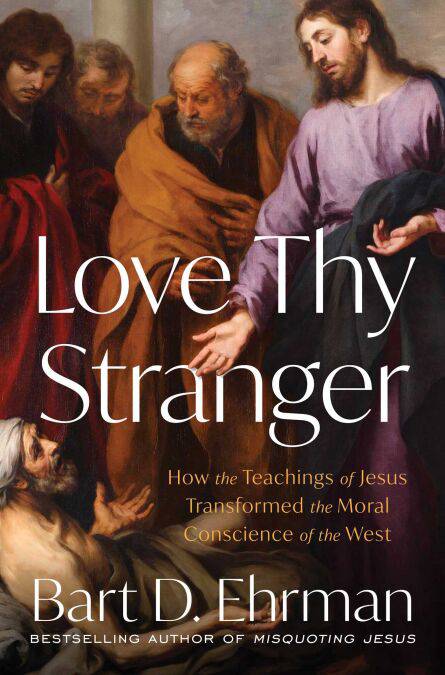
Bedankt voor het vertrouwen het afgelopen jaar! Om jou te bedanken bieden we GRATIS verzending (in België) aan op alles gedurende de hele maand januari.
- Afhalen na 1 uur in een winkel met voorraad
- In januari gratis thuislevering in België
- Ruim aanbod met 7 miljoen producten
Bedankt voor het vertrouwen het afgelopen jaar! Om jou te bedanken bieden we GRATIS verzending (in België) aan op alles gedurende de hele maand januari.
- Afhalen na 1 uur in een winkel met voorraad
- In januari gratis thuislevering in België
- Ruim aanbod met 7 miljoen producten
Zoeken
Love Thy Stranger E-BOOK
How the Teachings of Jesus Transformed the Moral Conscience of the West
Bart D. Ehrman
E-book | Engels
€ 16,76
+ 16 punten
Omschrijving
From the New York Times bestselling author of Misquoting Jesus comes a surprising history of Jesus’ most radical commandment—a new kind of altruism—tracing how the extraordinary duty to love even those who are strangers to us has shaped our world and our lives.
When we donate money to victims of natural disasters, or offer our forgiveness, or consider it a government’s responsibility to provide some basic assistance to those in need, we are (knowingly or not) demonstrating the enduring legacy of a particularly Christian kind of love.
For centuries, Greek and Roman moral philosophers prioritized generosity towards friends and family. Even Old Testament exhortations to love your neighbor gave little reason to consider the suffering of those beyond your own community.
Jesus changed all this, introducing a revolutionary new ethical obligation to love those you didn’t even know—unconditionally—and to demonstrate that love through acts of care. The implications of this radical commandment would be debated, misunderstood, and resisted by early Christians. But by the fifth century, a new “common sense” began to transform the moral conscience—and the politics—of the West.
In Love Thy Stranger, New Testament historian Bart D. Ehrman charts the causes and consequences of this ethical revolution with his signature sly humor and verve. For in this moment of renewed debate over the limitations of Christian love, Jesus’ most demanding commandment remains a thrillingly provocative one, even two millennia on.
When we donate money to victims of natural disasters, or offer our forgiveness, or consider it a government’s responsibility to provide some basic assistance to those in need, we are (knowingly or not) demonstrating the enduring legacy of a particularly Christian kind of love.
For centuries, Greek and Roman moral philosophers prioritized generosity towards friends and family. Even Old Testament exhortations to love your neighbor gave little reason to consider the suffering of those beyond your own community.
Jesus changed all this, introducing a revolutionary new ethical obligation to love those you didn’t even know—unconditionally—and to demonstrate that love through acts of care. The implications of this radical commandment would be debated, misunderstood, and resisted by early Christians. But by the fifth century, a new “common sense” began to transform the moral conscience—and the politics—of the West.
In Love Thy Stranger, New Testament historian Bart D. Ehrman charts the causes and consequences of this ethical revolution with his signature sly humor and verve. For in this moment of renewed debate over the limitations of Christian love, Jesus’ most demanding commandment remains a thrillingly provocative one, even two millennia on.
Specificaties
Betrokkenen
- Auteur(s):
- Uitgeverij:
Inhoud
- Aantal bladzijden:
- 304
- Taal:
- Engels
Eigenschappen
- Productcode (EAN):
- 9781668025055
- Verschijningsdatum:
- 23/03/2026
- Uitvoering:
- E-book
- Beveiligd met:
- Adobe DRM
- Formaat:
- ePub

Alleen bij Standaard Boekhandel
+ 16 punten op je klantenkaart van Standaard Boekhandel
Beoordelingen
We publiceren alleen reviews die voldoen aan de voorwaarden voor reviews. Bekijk onze voorwaarden voor reviews.









